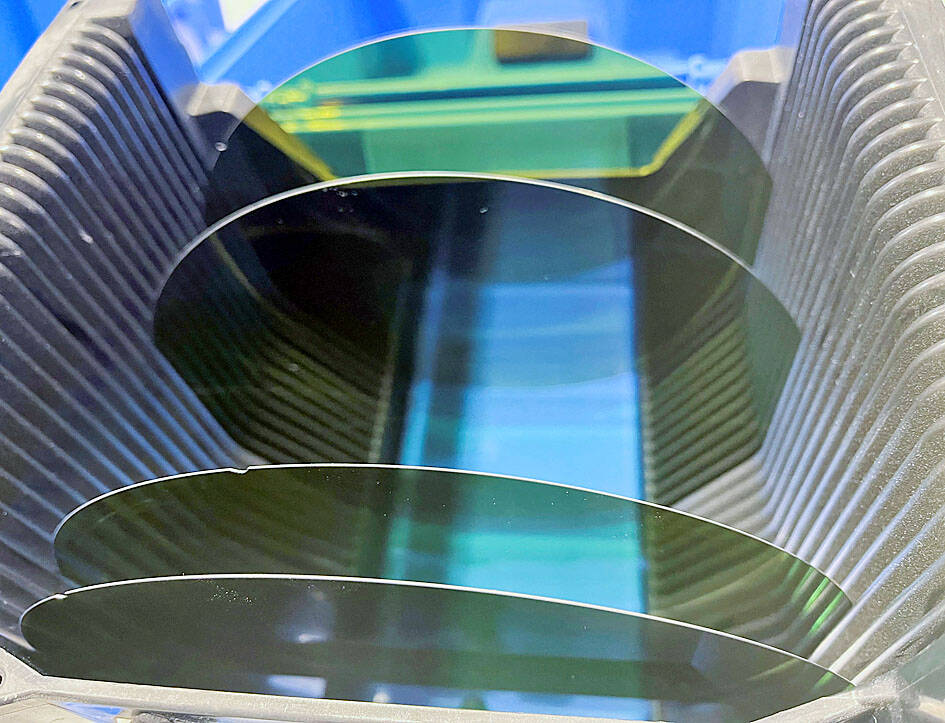Vanguard International Semiconductor Corp (世界先進) and Episil Technologies Inc (漢磊) yesterday announced plans to jointly build an 8-inch fab to produce silicon carbide (SiC) chips through an equity acquisition deal.
SiC chips offer higher efficiency and lower energy loss than pure silicon chips, and they are able to operate at higher temperatures. They have become crucial to the development of electric vehicles, artificial intelligence data centers, green energy storage and industrial devices.
Vanguard, a contract chipmaker focused on making power management chips and driver ICs for displays, is to acquire a 13 percent stake in Episil for NT$2.48 billion (US$77.1 million).

Photo: Reuters
It is to subscribe to 50 million Episil shares at NT$49.6 each through a private placement, the companies said in a joint statement.
The offer represented a discount of 20 percent to Episil’s closing price of NT$61.9 yesterday.
Episil plans to use the proceeds to fund the construction of the 8-inch fab, which is expected to ramp up production in the second half of 2026, the statement said.
As the two firms collaborate on the research and development of SiC technologies, as well as the production of 8-inch SiC wafers, it would help Vanguard broaden its product portfolios and complete its compound semiconductor lineup that includes gallium nitride (GaN) chips, Vanguard chairman Fang Leuh (方略) said in the statement.
Vanguard earlier this year said that it plans to start pilot production of its second-generation GaN chips by the end of this year.

UNCERTAINTY: Innolux activated a stringent supply chain management mechanism, as it did during the COVID-19 pandemic, to ensure optimal inventory levels for customers Flat-panel display makers AUO Corp (友達) and Innolux Corp (群創) yesterday said that about 12 to 20 percent of their display business is at risk of potential US tariffs and that they would relocate production or shipment destinations to mitigate the levies’ effects. US tariffs would have a direct impact of US$200 million on AUO’s revenue, company chairman Paul Peng (彭雙浪) told reporters on the sidelines of the Touch Taiwan trade show in Taipei yesterday. That would make up about 12 percent of the company’s overall revenue. To cope with the tariff uncertainty, AUO plans to allocate its production to manufacturing facilities in

TAKING STOCK: A Taiwanese cookware firm in Vietnam urged customers to assess inventory or place orders early so shipments can reach the US while tariffs are paused Taiwanese businesses in Vietnam are exploring alternatives after the White House imposed a 46 percent import duty on Vietnamese goods, following US President Donald Trump’s announcement of “reciprocal” tariffs on the US’ trading partners. Lo Shih-liang (羅世良), chairman of Brico Industry Co (裕茂工業), a Taiwanese company that manufactures cast iron cookware and stove components in Vietnam, said that more than 40 percent of his business was tied to the US market, describing the constant US policy shifts as an emotional roller coaster. “I work during the day and stay up all night watching the news. I’ve been following US news until 3am

COLLABORATION: Given Taiwan’s key position in global supply chains, the US firm is discussing strategies with local partners and clients to deal with global uncertainties Advanced Micro Devices Inc (AMD) yesterday said it is meeting with local ecosystem partners, including Taiwan Semiconductor Manufacturing Co (TSMC, 台積電), to discuss strategies, including long-term manufacturing, to navigate uncertainties such as US tariffs, as Taiwan occupies an important position in global supply chains. AMD chief executive officer Lisa Su (蘇姿丰) told reporters that Taiwan is an important part of the chip designer’s ecosystem and she is discussing with partners and customers in Taiwan to forge strong collaborations on different areas during this critical period. AMD has just become the first artificial-intelligence (AI) server chip customer of TSMC to utilize its advanced

Six years ago, LVMH’s billionaire CEO Bernard Arnault and US President Donald Trump cut the blue ribbon on a factory in rural Texas that would make designer handbags for Louis Vuitton, one of the world’s best-known luxury brands. However, since the high-profile opening, the factory has faced a host of problems limiting production, 11 former Louis Vuitton employees said. The site has consistently ranked among the worst-performing for Louis Vuitton globally, “significantly” underperforming other facilities, said three former Louis Vuitton workers and a senior industry source, who cited internal rankings shared with staff. The plant’s problems — which have not